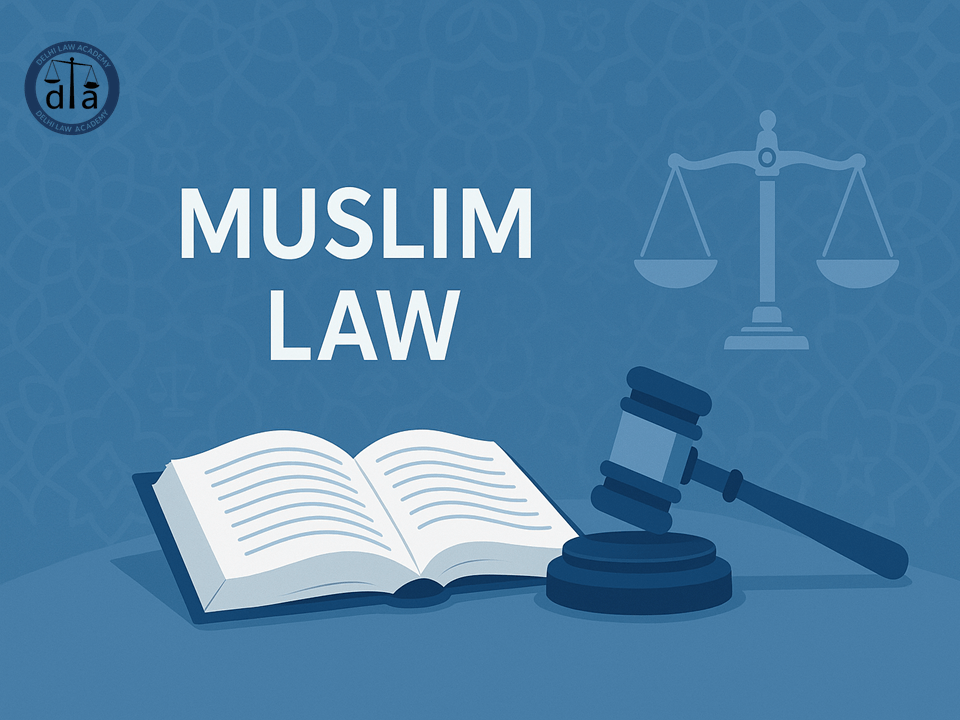
📘 Preparation for RJS, DJS, PCS (J) and Other Judicial Service Exams
💠 MUSLIM LAW
📜 SHAMIM ARA v. STATE OF U.P. [2002 SC]
Muslim Law is an important component of most Judicial Service exams in the country. Its thorough knowledge is a must for all aspirants of RJS, DJS, PCS (J) and other Judicial Service exams. To help such aspirants, DELHI LAW ACADEMY JAIPUR has launched a series of study material modules on all important aspects of this important part of their syllabus:
Shamim Ara, the appellant and Abrar Ahmad, the respondent were married some time in 1968 according to Muslim Shariyat Law. On 12.4.1979, the appellant, on behalf of herself and for her two minor children, filed an application under Section 125 Cr.P.C. complaining of desertion and cruelty on the part of respondent.
The respondent in his reply (written statement) dated 5.12.1990, to the application under Section 125 Cr.P.C., denied all the averments made in the application. One of the pleas taken by way of additional pleas is that he had divorced the appellant on 11.7.1987 and since then the parties had ceased to be spouses. He also claimed protection behind the Muslim Women (Protection of Rights on Divorce) Act, 1986.
The singular issue arising for decision is whether the appellant can be said to have been divorced and the said divorce communicated to the appellant so as to become effective from 5.12.1990, the date of filing of the written statement by the respondent.
No text has been brought to our notice which provides that a recital in any document, whether a pleading or an affidavit, incorporating a statement by the husband that he has already divorced his wife on an unspecified or specified date even if not communicated to the wife would become an effective divorce on the date on which the wife happens to learn of such statement contained in the copy of the affidavit or pleading served on her.
📘 Mulla on Principles of Mahomedan Law
Oral Talak. __ No particular form of words is prescribed for effecting a talak. If the words are express or well understood as implying divorce no proof of intention is required. It is not necessary that the talak should be pronounced in the presence of the wife or even addressed to her. The talak pronounced in the absence of the wife takes effect though not communicated to her, but for purposes of dower it is not necessary that it should come to her knowledge.”
💭 Should Muslim Wives Suffer This Tyranny for All Times?
In an illuminating judgment, eminent judge and jurist V.R. Krishna Iyer has made extensive observations. The judgment is reported as A. Yousuf Rawther Vs. Sowramma, [1971 Kerala]:
Marginal distortions are inevitable when the Judicial Committee in Downing Street has to interpret Manu and Muhammad of India and Arabia. The soul of a culture cannot be fully understood by alien minds. The view that the Muslim husband enjoys an arbitrary, unilateral power to inflict instant divorce does not accord with Islamic injunctions.”
“It is a popular fallacy that a Muslim male enjoys, under the Quaranic Law, unbridled authority to liquidate the marriage. “The whole Quoran expressly forbids a man to seek pretexts for divorcing his wife, so long as she remains faithful and obedient to him, ‘if they (namely, women) obey you, then do not seek a way against them’.
The Islamic law gives to the man primarily the faculty of dissolving the marriage, if the wife, by her indocility or her bad character, renders the married life unhappy.”
📖 Gauhati High Court in Jiauddin Ahmed’s Case
Quoting in the judgment several Holy Quranic verses, the learned Judge expressed disapproval of the statement that “the whimsical and capricious divorce by the husband is good in law, though bad in theology” and observed that such a statement is based on the concept that women were chattel belonging to men, which the Holy Quran does not brook. The correct law of talaq as ordained by the Holy Quran is that talaq must be for a reasonable cause and be preceded by attempts at reconciliation between the husband and the wife by two arbiters __ one from the wife’s family and the other from the husband’s; if the attempts fail, talaq may be effected.
⚖️ Bai Tahira v. Ali Hussain [1979 SC]
“Article 15(3) has compelling, compassionate relevance in the context of S. 125 and the benefit of doubt, if any, in statutory interpretation belongs to the ill-used wife and the derelict divorcee.”
The plea taken by the husband-respondent in his written statement may be re-noticed. Accusing the wife of having brought disgrace to the family, the respondent proceeds to state __ “The answering respondent, feeling fade up with all such activities unbecoming of the wife-petitioner, has divorced her on 11.7.87.”
The particulars of the alleged talaq are not pleaded nor the circumstances under which and the persons, if any, in whose presence talaq was pronounced have been stated.
We are also of the opinion that the talaq to be effective has to be pronounced. The term ‘pronounce’ means to proclaim, to utter formally, to declare, to articulate. There is no proof of talaq having taken place on 11.7.1987.
What the High Court has upheld as talaq is the plea taken in the written statement and its communication to the wife by delivering a copy of the written statement on 5.12.1990.
We are very clear in our mind that a mere plea taken in the written statement of a divorce having been pronounced sometime in the past cannot by itself be treated as effectuating talaq on the date of delivery of the copy of the written statement to the wife. The respondent ought to have adduced evidence and proved the pronouncement of talaq on 11.7.1987 and if he failed in proving the plea raised in the written statement, the plea ought to have been treated as failed.
A plea of previous divorce taken in the written statement cannot at all be treated as pronouncement of talaq by the husband on wife on the date of filing of the written statement in the Court followed by delivery of a copy thereof to the wife.
For the foregoing reasons, the appeal is allowed. Neither the marriage between the parties stands dissolved on 5.12.1990 nor does the liability of the respondent to pay maintenance comes to an end on that day. The respondent shall continue to remain liable for payment of maintenance until the obligation comes to an end in accordance with law.
📚 Continue Your Muslim Law Preparation
Don’t stop here! Strengthen your knowledge of Muslim Law with our blogs:
📘 Free Study Material for Judiciary Aspirants!
Download our FREE study material prepared by Delhi Law Academy’s expert faculty.
❓ Frequently Asked Questions – Shamim Ara Case
According to Shamim Ara v. State of U.P. [2002 SC], a mere plea of previous divorce in a written statement cannot effectuate talaq. The marriage does not stand dissolved unless talaq is properly pronounced.
No. The court held that a written statement claiming previous divorce does not constitute effective talaq unless there is proof of actual pronouncement.
Yes. The respondent remains liable for payment of maintenance until the obligation legally ends, even if the husband claims he divorced the wife earlier.
Section 125 CrPC allows the wife to claim maintenance. Shamim Ara case reaffirmed that desertion or cruelty complaints under Section 125 are valid even if the husband claims talaq in his written statement.
Mulla on Principles of Mahomedan Law clarifies that talaq can be oral or written. However, the court emphasized proof of pronouncement is necessary for the talaq to be effective.
✅ Yes. The judgment reinforced that arbitrary or unilateral divorces cannot take effect without proper pronouncement, protecting women from abuse of personal law.
Contact us
📍 Delhi Law Academy – Jaipur Branch
6C, Tower 2, Coaching Hub, Pratap Nagar, Jaipur – 302033
📞 Phone:
+91 9911916552
+91 8447285606
✉️ Email:
contactus@delhilawacademy.com

